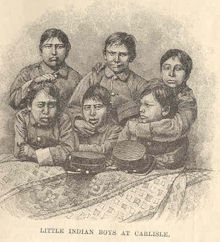
Yankton, Dakota Territory,
April 5, 1850.
General Armstrong:
My Friend,
I never saw you, but I have a strong attachment for you. I already wrote you two letters, as yon know, but to-day I have thought of yon again.
“I had two boys big enough to help me to work, but you have them now. I wanted them to learn your language, and I want you to look after them as if they were your boys.
This is all, my friend.
Fat Mandan is my name, and I shake your hand.”
There are many, no doubt, who will smile at the title of this article, much as if it had read, ” Education for Buffaloes and Wild Turkeys.” Such, however, will be likely to read it, as others will from a more sympathetic stand-point. For it is evident that, from one stand point or another, public interest is excited upon the Indian question now as perhaps never before.
With the opening up of the country, and the disappearance of the game before the settler’s axe and locomotive whistle-to say nothing of treaty ” reconstruction” and Indian wars-the conditions of, the Indian himself have radically altered, and perhaps not in all respects for the worse, since the shrewd Saponi sachem declined William and Mary’s classical course for his young braves, because it would not improve them in deer-stalking or scalp-lifting, but, not to be outdone in graciousness, offered instead to bring up the Royal Commissioners’ sons in his own wigwam, and “make men of them.”
Fat Mandan, on the contrary, seems to think that to make men of them is just what Hampton will do for the boys he is so proud of, and he looks to them to help him to work, not to hunt. It is possible that red and white theories of education and manhood have healthily approximated in fifty or a hundred years.
To a young colonel of the Union army in the late war, as he stood on the wheelhouse of a transport, with his black regiment camping down on the deck below him, floating down the Gulf of Mexico through the double glory of sunset sky and wave, there came, like a vision shaped half from dreamy memories of his island home in the Pacific, and half from earnest thought for his country’s future, a plan for a practical solution of one of her troubles, and the salvation of the race that was its innocent and long-suffering cause. Four years later the dream which had faded in the stern realities of war was called into life by the exigencies of the new era, and took tangible form as a normal and agricultural school for freedmen at Hampton, Virginia, twenty miles from the port where slaves first landed in America, and on the very shores where they were first made free as “contraband of war.”
The growth of this institution under the charge of its originator was described seven years ago in this Magazine, since which time it has attracted the attention of leading thinkers upon education and race problems in this and other countries, and become widely known as an exponent of the value of manual-labor training in education of men and women-certainly as far as the black race is concerned. Twelve years have proved its mission in the South to be no “fool’s errand.”
